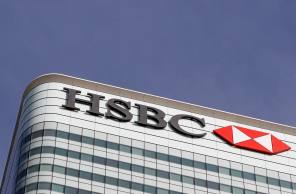

The share price of banking giant HSBC are 2.6 per cent lower in London this morning (20 February) after the company announced annual results that were below expectations.
For the year to 31 December 2017, the company reported revenues of $51.5bn (£36.9bn) and a net profit of $9.7bn (£6.9bn).
That compared to a profit of £930m for the previous year, however that level of improvement is something of a mirage, as the 2016 profit number was shoved artificially lower by a range of one-off charges.
The number most watched by analysts when it comes to bank results is that of return on equity.
Rob James, a banks analyst at Old Mutual Global Investors, said the market typically wants a bank to achieve a return on equity of 10 per cent.
In the results announcement this morning, HSBC disclosed a return on equity of just 5.9 per cent.
The market also noted the lack of a definite announcement regarding a share buyback programme.
Management merely said such a programme would happen "when appropriate".
The dividend was also maintained, rather than increased.
In the statement accompanying the results, HSBC management said higher interest rates globally would significantly improve the returns the bank can achieve.
Mr James said this is because HSBC has a surplus of deposits over liabilities of around $400bn (£286bn).
This capital is held in low yielding but very liquid assets such as short dated government bonds.
The yield on those assets, which represents income for HSBC, has been at historic low levels for the past decade, but bond yields have been increasing in 2018.
HSBC reported that 75 per cent of its profit came from Asia.
The company said increased freedom of trade in Asian economies should prove a boost to its business, but the the threat of protectionism from other parts of the world means it is modelling different risk scenarios for how such restrictions on trade could impact its business.
Stuart Gulliver stands down as chief executive of the company today (20 February), and is replaced by John Flint, who had been head of retail banking at the firm.
Mr Gulliver said he will remain a significant shareholder in HSBC even after he departs the company.
david.thorpe@ft.com



